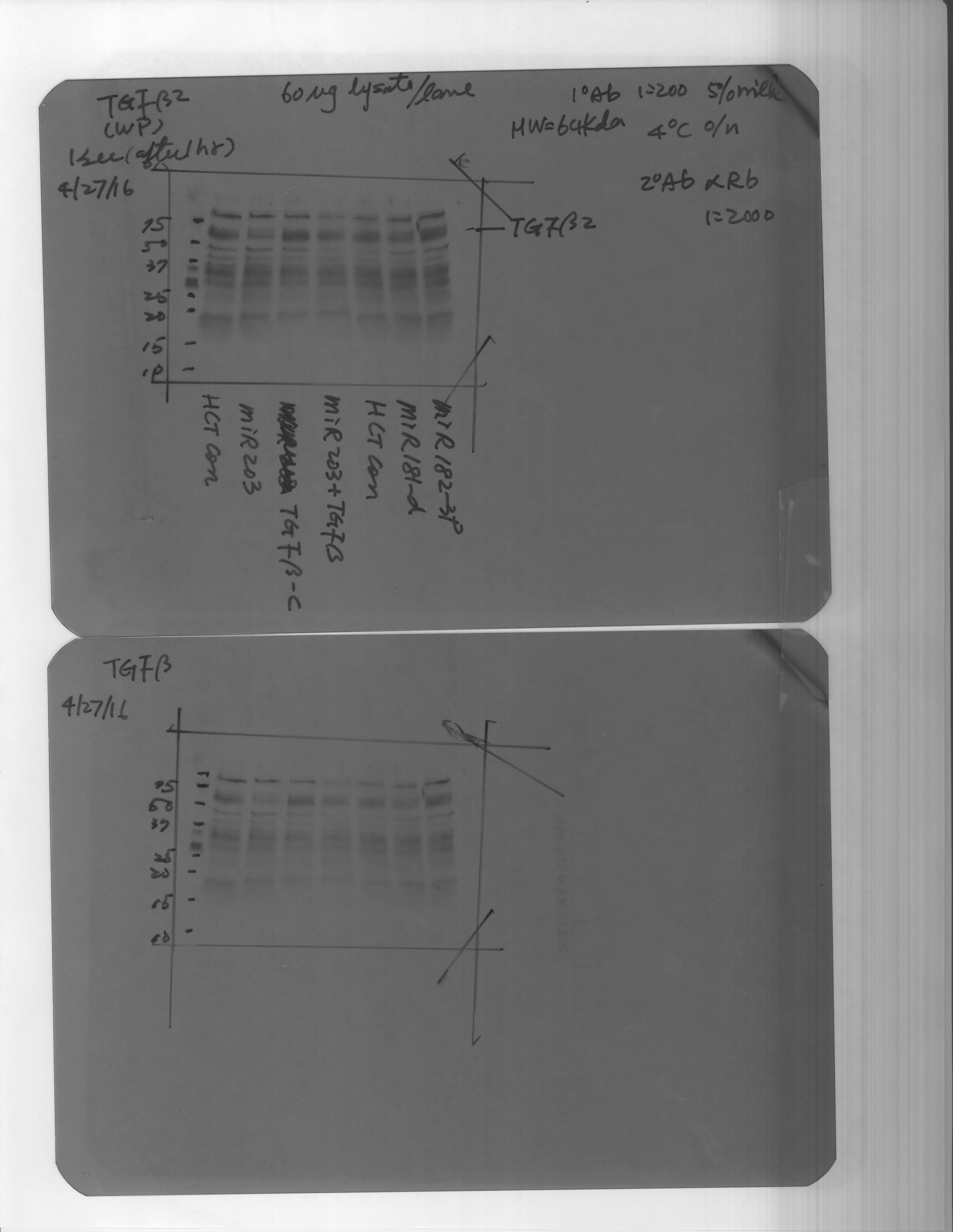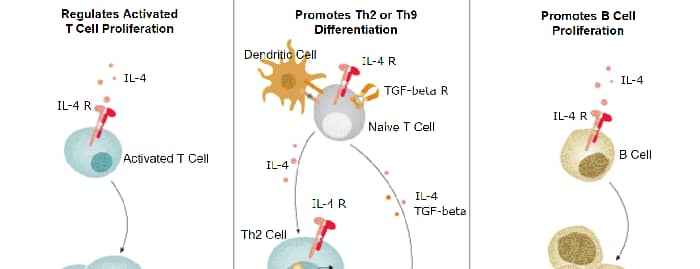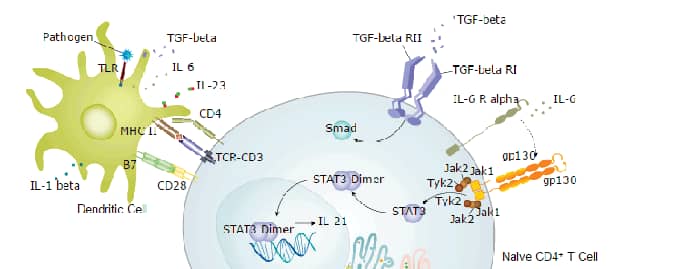TGF-beta 2 Antibody Summary
Applications
Please Note: Optimal dilutions should be determined by each laboratory for each application. General Protocols are available in the Technical Information section on our website.
Scientific Data
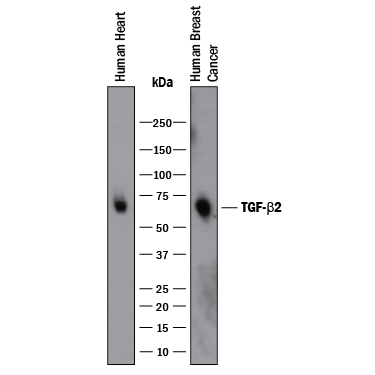 View Larger
View Larger
Detection of Human TGF‑ beta 2 by Western Blot. Western blot shows lysates of human heart tissue and human breast cancer tissue. PVDF membrane was probed with 0.1 µg/mL of Rabbit Anti-TGF-beta 2 Polyclonal Antibody (Catalog # AB-12-NA) followed by HRP-conjugated Anti-Rabbit IgG Secondary Antibody (Catalog # HAF008). A specific band was detected for TGF-beta 2 at approximately 70 kDa (as indicated). This experiment was conducted under reducing conditions and using Immunoblot Buffer Group 1.
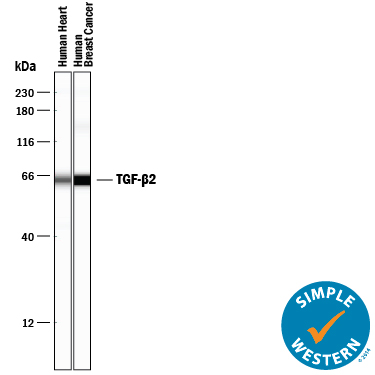 View Larger
View Larger
Detection of Human TGF‑ beta 2 by Simple WesternTM. Simple Western lane view shows lysates of human heart tissue and human breast cancer tissue, loaded at 0.2 mg/mL. A specific band was detected for TGF‑ beta 2 at approximately 64 kDa (as indicated) using 5 µg/mL of Rabbit Anti-TGF‑ beta 2 Polyclonal Antibody (Catalog # AB-12-NA). This experiment was conducted under reducing conditions and using the 12-230 kDa separation system.
 View Larger
View Larger
TGF‑ beta 2 Inhibition of IL‑4-dependent Cell Proliferation and Neutralization by TGF‑ beta 2 Antibody. Porcine TGF-beta 2 (Catalog # 102-B2) inhibits Recombinant Mouse IL-4 (Catalog # 404-ML) induced proliferation in the HT-2 mouse T cell line in a dose-dependent manner (orange line). Inhibition of Recombinant Mouse IL-4 (7.5 ng/mL) activity elicited by Porcine TGF-beta 2 (1 ng/mL) is neutralized (green line) by increasing concentrations of Rabbit Anti-TGF-beta 2 Polyclonal Antibody (Catalog # AB-12-NA). The ND50 is typically 0.25-1.25 µg/mL.
Reconstitution Calculator
Preparation and Storage
- 12 months from date of receipt, -20 to -70 °C as supplied.
- 1 month, 2 to 8 °C under sterile conditions after reconstitution.
- 6 months, -20 to -70 °C under sterile conditions after reconstitution.
Background: TGF-beta 2
TGF-beta 2 (transforming growth factor beta 2) is one of three closely related mammalian members of the large TGF-beta superfamily that share a characteristic cysteine knot structure (1-7). TGF-beta 1, -2 and -3 are highly pleiotropic cytokines proposed to act as cellular switches that regulate processes such as immune function, proliferation and epithelial-mesenchymal transition (1-4). Each TGF-beta isoform has some non-redundant functions; for TGF-beta 2, mice with targeted deletion show defects in development of cardiac, lung, craniofacial, limb, eye, ear and urogenital systems (2). Human TGF-beta 2 cDNA encodes a 414 amino acid (aa) precursor that contains a 19 aa signal peptide and a 395 aa proprotein (8). A furin-like convertase processes the proprotein to generate an N-terminal 232 aa latency-associated peptide (LAP) and a C-terminal 112 aa mature TGF- beta 2 (8, 9). Disulfide-linked homodimers of LAP and TGF-beta 2 remain non-covalently associated after secretion, forming the small latent TGF-beta 1 complex (8-10). Covalent linkage of LAP to one of three latent TGF-beta binding proteins (LTBPs) creates a large latent complex that may interact with the extracellular matrix (9, 10). TGF-beta is activated from latency by pathways that include actions of the protease plasmin, matrix metalloproteases, thrombospondin 1 and a subset of integrins (10). Mature human TGF-beta 2 shows 100% aa identity with porcine, canine, equine and bovine TGF-beta 2, and 97% aa identity with mouse and rat TGF-beta 2. It demonstrates cross-species activity (1). TGF-beta 2 signaling begins with binding to a complex of the accessory receptor betaglycan (also known as TGF-beta RIII) and a type II ser/thr kinase receptor termed TGF-beta RII. This receptor then phosphorylates and activates another ser/thr kinase receptor, TGF-beta RI (also called activin receptor-like kinase (ALK) -5), or alternatively, ALK-1. The whole complex phosphorylates and activates Smad proteins that regulate transcription (3, 11, 12). Use of other signaling pathways that are Smad-independent allows for disparate actions observed in response to TGF-beta in different contexts (11).
- Sporn, M.B. (2006) Cytokine Growth Factor Rev. 17:3.
- Dunker, N. and K. Krieglstein, 2000, Eur. J. Biochem. 267:6982.
- Wahl, S.M. (2006) Immunol. Rev. 213:213.
- Chang, H. et al. (2002) Endocr. Rev. 23:787.
- Lin, J.S. et al. (2006) Reproduction 132:179.
- Hinck, A.P. et al. (1996) Biochemistry 35:8517.
- Mittl, P.R.E. et al. (1996) Protein Sci. 5:1261.
- deMartin, R. et al. (1987) EMBO J. 6:3673.
- Miyazono, K. et al. (1988) J. Biol. Chem. 263:6407.
- Oklu, R. and R. Hesketh (2000) Biochem. J. 352:601.
- de Caestecker, M. et al. (2004) Cytokine Growth Factor Rev. 15:1.
- Zuniga, J.E. et al. (2005) J. Mol. Biol. 354:1052.
Product Datasheets
Citations for TGF-beta 2 Antibody
R&D Systems personnel manually curate a database that contains references using R&D Systems products. The data collected includes not only links to publications in PubMed, but also provides information about sample types, species, and experimental conditions.
6
Citations: Showing 1 - 6
Filter your results:
Filter by:
-
MicroRNA-30b controls endothelial cell capillary morphogenesis through regulation of transforming growth factor beta 2
Authors: GA Howe, K Kazda, CL Addison
PLoS ONE, 2017-10-04;12(10):e0185619.
Species: Human
Sample Types: Cell Lysates
Applications: Western Blot -
Tartrate-resistant acid phosphatase (TRAP/ACP5) promotes metastasis-related properties via TGF?2/T?R and CD44 in MDA-MB-231 breast cancer cells
Authors: A Reithmeier, E Panizza, M Krumpel, LM Orre, RMM Branca, J Lehtiö, B Ek-Rylande, G Andersson
BMC Cancer, 2017-09-15;17(1):650.
Species: Human
Sample Types: Whole Cells
Applications: Neutralization -
Cancer associated fibroblasts regulate keratinocyte cell-cell adhesion via TGF-�-dependent pathways in genotype-specific oral cancer
Authors: S S Prime
Carcinogenesis, 2016-11-01;0(0):.
Species: Human
Sample Types: Cell Culture Supernates
Applications: Neutralization -
Immunobiotic Lactobacillus jensenii as immune-health promoting factor to improve growth performance and productivity in post-weaning pigs.
Authors: Suda, Yoshihit, Villena, Julio, Takahashi, Yu, Hosoya, Shoichi, Tomosada, Yohsuke, Tsukida, Kohichir, Shimazu, Tomoyuki, Aso, Hisashi, Tohno, Masanori, Ishida, Mitsuhar, Makino, Seiya, Ikegami, Shuji, Kitazawa, Haruki
BMC Immunol, 2014-06-19;15(0):24.
Species: Porcine
Sample Types: Whole Cells
Applications: Flow Cytometry -
Differential versican isoforms and aggrecan expression in the chicken embryo aorta.
Authors: Arciniegas E, Neves CY, Candelle D, Parada D
Anat Rec A Discov Mol Cell Evol Biol, 2004-07-01;279(1):592-600.
Species: Chicken
Sample Types: Whole Tissue
Applications: IHC -
Isoform specificity of commercially-available anti-TGF-beta antibodies.
Authors: Mozes MM, Hodics T, Kopp JB
J. Immunol. Methods, 1999-05-27;225(1):87-93.
Species: Human
Sample Types: Recombinant Protein
Applications: Western Blot
FAQs
No product specific FAQs exist for this product, however you may
View all Antibody FAQsReviews for TGF-beta 2 Antibody
Average Rating: 3 (Based on 1 Review)
Have you used TGF-beta 2 Antibody?
Submit a review and receive an Amazon gift card.
$25/€18/£15/$25CAN/¥75 Yuan/¥2500 Yen for a review with an image
$10/€7/£6/$10 CAD/¥70 Yuan/¥1110 Yen for a review without an image
Filter by:
